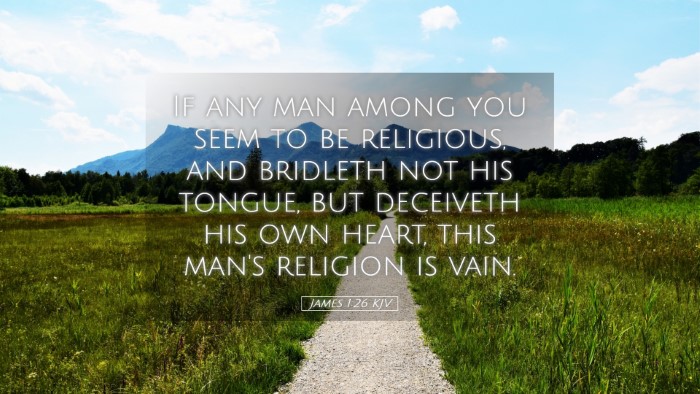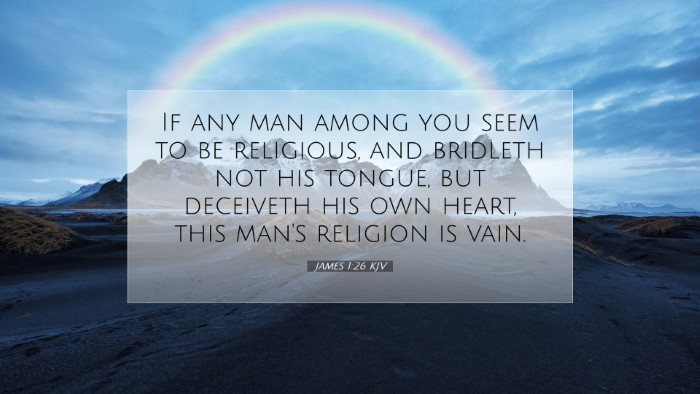Old Testament
Genesis Exodus Leviticus Numbers Deuteronomy Joshua Judges Ruth 1 Samuel 2 Samuel 1 Kings 2 Kings 1 Chronicles 2 Chronicles Ezra Nehemiah Esther Job Psalms Proverbs Ecclesiastes Song of Solomon Isaiah Jeremiah Lamentations Ezekiel Daniel Hosea Joel Amos Obadiah Jonah Micah Nahum Habakkuk Zephaniah Haggai Zechariah MalachiJames 1:26
James 1:26 KJV
If any man among you seem to be religious, and bridleth not his tongue, but deceiveth his own heart, this man's religion is vain.
James 1:26 Bible Commentary
Commentary on James 1:26
Verse: "If anyone thinks himself to be religious, and yet does not bridle his tongue but deceives his own heart, this man's religion is worthless." (James 1:26, NASB)
Introduction
The epistle of James addresses the practical aspects of faith, emphasizing the importance of genuine religion that aligns with one's actions. James 1:26 serves as a pivotal verse in this discourse, drawing attention to the relationship between one's speech and the authenticity of their faith.
Insights from Commentaries
-
Matthew Henry's Commentary
Matthew Henry notes that the verse serves as a warning against self-deception in religious matters. He points out that true religion is not merely about outward expressions of faith; it is rooted in inner character and restraint over one's speech. The tongue, in this instance, is a reflection of the heart, revealing whether one's faith is genuine or hypocritical.
Henry emphasizes the importance of "bridling" the tongue, which symbolizes control and discipline. He further elucidates that those who fail to guard their speech demonstrate a lack of true religion, indicating that their claims to faith may be hollow and without substance.
-
Albert Barnes' Notes on the Bible
Albert Barnes elaborates on the concept that religion that does not transform a person's speech is devoid of value. He asserts that the tongue is often a source of great harm and is capable of betraying the true condition of an individual's heart. Barnes highlights that the term "religious" encompasses not only the rituals of worship but also ethical living, emphasizing integrity in both speech and action.
He notes the distinction made by James between true and false religion. True religion is manifested in good deeds and restrained speech, susceptible neither to wrath nor to deceit. Barnes encourages believers to examine their words critically as an indicator of their spiritual state.
-
Adam Clarke's Commentary
Adam Clarke's insightful commentary stresses that the tongue must be tamed as a sign of a believer's maturity in faith. He argues that the ability to control one's speech is indicative of the Spirit's work within a person. Clarke also points out that the word "religious" in this context implies a zeal for piety that should be coupled with ethical behavior.
Clarke warns against the idea of religion being centered solely on rituals and outward acts, urging that true devotion reflects in the manner of speaking, treating others, and living out one’s faith. He concludes that without mastering one’s words, any profession of faith is ultimately empty.
Theological Significance
The teaching in James 1:26 is profound in its clarity about the necessity of connection between faith and conduct. Theological implications highlight that believers are called to a faith that informs every aspect of their lives, including communication. This verse reinforces a central Christian doctrine: that true faith manifests in transformed living.
Moreover, it draws attention to the ethical implications of speech and its role in relationships and community. By maintaining a disciplined tongue, a believer not only reflects the influence of the Holy Spirit but also fulfills the command to love one’s neighbor through constructive communication.
Practical Applications
For pastors, students, theologians, and Bible scholars, James 1:26 provides a framework for evaluating personal and communal faith practices:
- Self-Examination: Regularly assess how your speech aligns with your faith. Are your words reflective of a loving and truthful heart?
- Accountability: Foster environments where brothers and sisters in Christ can hold one another accountable regarding their speech and actions.
- Teaching and Discipleship: Incorporate principles of speech control into spiritual teaching, helping others understand the gravity of words.
- Prayer and Supplication: Engage in prayer, asking for help in managing one's tongue, recognizing the need for divine assistance in overcoming natural inclinations.
Conclusion
James 1:26 serves as an enduring reminder of the integral relationship between faith and practice. It calls for a disciplined and reflective approach to one’s speech as a measure of authentic religion. The insights drawn from the esteemed commentaries of Matthew Henry, Albert Barnes, and Adam Clarke reinforce the necessity for believers to ensure their words are expressions of their faith, rooted in a heart transformed by Christ.


